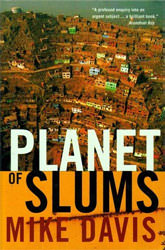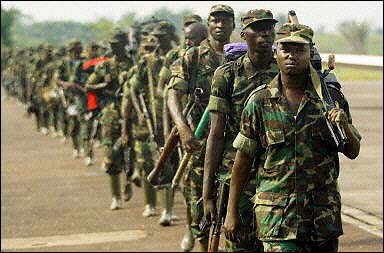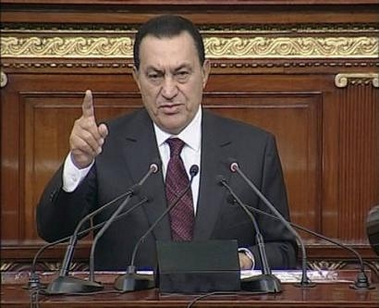
Some time this year a person will leave their farm or a village and settle in a city. Although wholly unremarkable in itself, it will be a significant statistical moment for humanity. It will mean for the
first time ever the urban population of the world will outnumber the rural. It is possible it has already happened.
In 1972 the global thinktank Club of Rome predicted this would happen with its dystopian report
The Limits to Growth. This report suggested the world would run out of key resources within 30 years. Although 35 years later technology and efficiency seemed to make a joke of its predictions, there is no doubting the rise of cities. In 1950 there were 86 cities in the world with a population greater than a million, today there are 400 and, according to the UN Department of Economic and Social Affairs by 2015 there will be at least 550. Cities will account for all future growth in the world’s population which is expected to peak at 10 billion in 2050.
95% of this growth will occur in developing countries. The Far Eastern Economic Review predicts that by 2025 Asia will have ten hypercities of 20 million or more. Some of these Chinese megalopolises may just be the first stage of a continuous urban corridor from stretching from Korea to Java. These new cities will lack clear urban/rural boundaries as they by-pass or surround smaller towns. American academic Mike Davis addresses these new structures and the problems they entail in his book
Planet of Slums. Davis’s book is a Marxist perspective of everything that is wrong with the cities of the south. He examines the roots of urban poverty and concludes that policies of agricultural deregulation and the financial discipline of the IMF and World Bank generated an exodus of surplus rural labour into cities that no longer had the jobs to support them.
The UN performed the first global audit of urban poverty with its 2003 report
The Challenge of Slums. It defined a slum as characterised by overcrowding, poor housing, inadequate access to water and sanitation, and insecurity of tenure. By this definition it estimated that one billion people worldwide are now living in the slums of the Global south. An astonishing 99% of the population of Ethiopia and Chad live in slums with Afghanistan (98%) and Nepal (92%) not far behind. Mumbai is the world’s largest concentration of slums with 12 million squatters followed by Mexico City and Dhaka with almost ten million each.
There are almost 200,000 slums on the planet most of which have sprung up since the 1960s. Most squat on publicly owned land, downwind of pollution, with high commuting costs to work and low infrastructure. In Cairo’s
City of the Dead, a million people use Mameluke tombs as prefabricated housing. In Lima, the Catholic Church is the main slum landlord and the poor live in callejones full of dilapidated and unstable adobe huts where 85 people share a tap and 93 use the same latrine.
In Hong Kong, 250,000 people live illegally on rooftops and filled-in airwells in the centre of buildings. Many people live on the streets themselves. While 100,000 live in LA, the first world’s “capital of homelessness”, that number is dwarfed by the
million that camp out on the streets of Mumbai.
The majority of the world’s slumdwellers have been forced out to the edge of cities. These “edges” have often become bigger than the cities they surround and these compounds are now called “peri-urban”. These urban fringes are regulatory vacuums and usually in the middle of polluting toxic and often illegal industry. Often they are site of waste dumps such as the aptly named Quarantina outside Beirut, Hillat Kusha (Khartoum) and the massive Dhapa dump near
Kolkata.
All these slums are new developments. In
colonial times, there were strict controls on movement of natives who were often denied urban land ownership and permanent residence. The British feared city life would destabilise locals and increase solidarity between tribes. Once Asian and African countries began to gain independence, a flood of poor was unleashed on the cities. Partition and war on the subcontinent created millions of refugees in India, Pakistan and Bangladesh. In Latin America, the overthrow of dictatorships created a window of opportunity for a land grab by squatters.
While Third World countries conceded defeat against the growing slums, the IMF and World Bank became increasingly influential in setting social policies. The World Bank increased its
urban development lending from $10 million in 1972 to $2 billion in 1988. But most of their slum upgrading projects had little impact as they failed to address employment creation and public transport issues. These projects have also strengthened the hand of NGOs co-opted to provide services at the expense of local groups. In India, the UK-sponsored Indore sanitation scheme which won external awards was revealed as a sham. The city had new sewers but not enough drinking water nor any to flush waste. Sewage backed up into homes and streets spreading cholera and malaria.

Many countries have embraced the ideas of
Hernando de Soto, a Peruvian businessman who has become the guru of neo-liberal populism. His main assertion is that the poor are suffering from a lack of property rights. He believes the poor are industrious and entrepreneurial but are hampered from expanding their “businesses” because they cannot access the capital in their own homes. He argued that titling would create massive equity which would create new jobs in slums. But while it is a good idea for some, titling accentuates social differences between those who can afford to pay the city taxes that come with property and those that cannot.
Meanwhile banks are still refusing to lend to newly titled poor. The titles themselves have attracted interest from absentee landlords, developers and politicians who have forced squatters off the land as soon as it becomes valuable. Soaring land values have forced squatters out of their dwellings into ever more peripheral areas, often into cleared hillsides which are
prone to landslides and flooding. The poor are squashed into ever smaller areas. Half of Nairobi’s population lives on 18% of its land. In Dhaka, 70% live on just one fifth of the land. Many city administrations are locked in a war with their own poor. In the 1970s, Dakar authorities described the 70,000 people they forcibly removed from the centre of the city as “human encumberments”. Slumdwellers have often rioted against this type of treatment only to feel the full force of the police or military in response.
This mutual suspicion between authorities and the poor has lead to what Mike Davis called the “Haussmannisation of the tropics”.
Baron Haussmann cleared the Parisian slums of the 1800s and created the Panopticon environment where potential rioters more easily be “watched” by authorities. Many cities in the South are now clearing vast areas where the poor live, mostly to make way for highways and luxury compounds. Shanghai forcibly relocated 1.5 million people in the 1990s to make way for skyscrapers, apartments and malls.
Beautification campaigns are another scourge of the poor. Under the Marcos regime, Manila cleared several shantytowns from parade routes for such events as Miss Universe, the IMF-World Bank meeting and the visit of President Ford. Altogether 160,000 people were moved out of the harm’s way of the world’s media and dumped 30kms outside the city. Seoul relocated 720,000 people for the 1988 Olympics and Beijing is on much the
same warpath for 2008 expecting to move 350,000 people to make way for new stadia.
Many governments have justified slum clearance as a means of combating crime. Israel has often invoked old British and Ottoman statutes when evicting Palestinian families and blowing up homes of unfortunates it labels “terrorists”. Meanwhile poor sections of Harare and Bulawayo had the temerity to vote for the opposition MDC in Zimbabwe’s tarnished 20055 election and in revenge Mugabe launched
Operation Murambasvina (“clean out the trash”). Its first phase was to arrest 17,000 street traders and bulldoze their shacks. In the second phase it targeted the remainder of the slum, expelling 700,000 people while arresting, beating or shooting anyone who resisted.
The reorganisation of urban space has created gated communities where the wealthy can live in isolation away from the “criminal elements” of the slums. Buenos Aires has privately built motorways that allow the rich to commute from their country clubs directly to their offices. Meanwhile a villa miseria outside the city is built over a former lake, a toxic dump and a cemetery in the middle of a flood zone. The shantytowns of Johannesburg and Belo Horizonte are sited on dangerous soil prone to slope failure or exposed to years of mining. Two thirds of Caracas’s population live on unstable hillsides or deep gorges in a geologically active zone. In 1999
rainfall debris from flash floods killed 32,000 and left 140,000 homeless and another 200,000 jobless.
As well as natural hazards, interaction with heavy industries, traffic and poor infrastructure have created new artificial hazards. An 1989 chemical explosion in Bangkok’s port slum of Klong Toey poisoned hundreds of residents and left thousands homeless, many of whom died of related illnesses. An 1984 petrol pipeline explosion in Sao Paolo burned 500 people to death in a neighbouring favela. A Pemex liquefied natural gas plant in Mexico City exploded atomically a few months later killing at least 2,000 people while they slept in their beds. Less than 3 weeks later, the
Union Carbide plant in Bhopal released a cloud of methyl isocynate which killed 10,000 immediately and another 15,000 later due to skin cancers. Housing conditions in Bhopal slum areas including overcrowding, poor ventilation, and exposure to dust and smoke, exacerbate the ocular effects, causing irritation and infections.
But most people in slums die in less spectacular circumstances. Since colonial times, the native zones of African and Asian cities have had no proper sanitation. Postcolonial regimes have been unable to solve the problem. The megacity of Kinshasa in Congo has no waterborne sewage system for ten million people. A Nairobi slum has ten pit latrines for 40,000 people. Half of Mumbai’s population has no access to toilets. As a result,
excrement is everywhere. The situation is worse for women whose needs to retain dignity and privacy means they have to wait until dark to defecate which exposes them to harassment and sexual assault.

Solutions from the IMF such as privatising the water supply have often led to the problems getting worse and forcing cities to charge for access to public toilets. These solutions are part of the
Structural Adjustment Programs (SAP) which the Bretton Woods institutions used against debt-ridden developing countries. Under the SAP, the claims of debtors took precedence over the needs of the poor. Uganda is a typical country which spends 12 times as much on debt relief as health care. During the Reagan administration, US aid was contingent on currency devaluation, privatisation and removal of import controls and food subsidies. Food producers were devastated by the elimination of subsidies in a global market dominated by heavily subsidised US and EU agribusiness.
SAP policies have turned a billion people into a global “
informal working class”. This is the class that de Soto and others have a fervent belief can become proto-capitalists with the right help. But these people are either laid off from the jobs, working for someone else, exploited by employers, or mostly disempowered women and children. Perhaps most importantly they are not creating new divisions of labour but fragmenting existing work. As Kinshasan Thierry Mayamba Nlandu says in Planet of Slums “Kinshasa is a dead city…The informal sector is not a deus ex machine but a ‘soulless wasteland’”. But not quite. Kinshasans, like the slum dwellers across the planet hold on to the city “by its thousand survival cracks and stubbornly refuse to let go”.
 Vietnam Catholic priest Thadeus Nguyen Van Ly was jailed yesterday for eight years for dissent. In a one day trial in the city of Hue, the 60 year old Father Ly was found guilty of charges of disseminating information to undermine the state. Four co-defendants also received prison terms ranging from 18 months suspended to six years. Ly was accused of producing anti-government documents and communicating with anti-communist groups overseas.
Vietnam Catholic priest Thadeus Nguyen Van Ly was jailed yesterday for eight years for dissent. In a one day trial in the city of Hue, the 60 year old Father Ly was found guilty of charges of disseminating information to undermine the state. Four co-defendants also received prison terms ranging from 18 months suspended to six years. Ly was accused of producing anti-government documents and communicating with anti-communist groups overseas. An official response from the Vietnamese Communist Party rejected these allegations. They claim HRW regularly produces “fabricated information” that fails to reflect the real situation in Vietnam. Foreign Ministry spokesperson Le Dung said "Although the State of Vietnam respects the rights to freedom and democracy of all citizens, the country never accepts the abuses of the rights to freedom and democracy to carry out activities that violate Vietnamese law.” He described the crackdown on dissidents as “nonsense”.
An official response from the Vietnamese Communist Party rejected these allegations. They claim HRW regularly produces “fabricated information” that fails to reflect the real situation in Vietnam. Foreign Ministry spokesperson Le Dung said "Although the State of Vietnam respects the rights to freedom and democracy of all citizens, the country never accepts the abuses of the rights to freedom and democracy to carry out activities that violate Vietnamese law.” He described the crackdown on dissidents as “nonsense”.


























